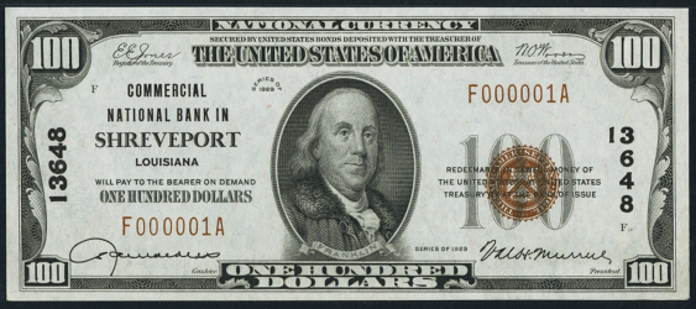One Hundred Dollar Notes › Nationals › 1929 One Hundred Dollar National Bank Notes › Michigan Charters › 1929 $100 Greenville Michigan First National Bank
Get Value Now
| Item | Info |
|---|---|
| Series | 1929 |
| Charter | #2054 First National Bank of Greenville, Michigan |
| Year Chartered | 1872, 61 Banks Chartered |
| City Info | Greenville is a city in Montcalm County of the U.S. state of Michigan. The population was 8,481 at the 2010 census. Greenville is named after its founder, John Green, who settled in the wilderness of the southwest part of Montcalm County in 1844. John Green constructed a sawmill on the Flat River that is credited for attracting other settlers. The newly formed Green's Village attracted many people of Danish origin who followed another early Danish settler's positive letters home regarding the area. Because of the town's heritage, Greenville celebrates the Danish Festival every year on the third weekend of August. A post office was established on January 20, 1848, with Abel French as the first postmaster. John Green had the village platted in 1853 and it was a station on the Detroit, Grand Rapids and Western Railroad. Greenville incorporated as a village in 1867 and as a city in 1871. Source: Wikipedia |
| Similar Cities | 30 banks with similar city. First 12 below: 1. Greenville, Pennsylvania - First National Bank 2. Greenville, Ohio - Farmers' National Bank 3. Greenville, Rhode Island - National Exchange Bank 4. Greenville, Illinois - First National Bank 5. Greenville, South Carolina - First National Bank 6. Greenville, Pennsylvania - Greenville National Bank 7. Greenville, Ohio - Second National Bank 8. Greenville, Texas - First National Bank 9. Greenville, Texas - Hunt County National Bank 10. Greenville, Michigan - City National Bank 11. Greenville, Texas - Greenville National Bank 12. Greenville, Mississippi - First National Bank |
| Seal Varieties | Small Brown |
| See Also | If your note doesn't match try: 1. 1929 $100 Federal Reserve Bank Note 2. 1928 $100 Federal Reserve Note 3. 1928A $100 Federal Reserve Note 4. 1934 $100 Federal Reserve Note 5. 1934A $100 Federal Reserve Note 6. 1934B $100 Federal Reserve Note |
| Other Info | 1. Value depends on notes known for charter, condition and market demand. |
| Neat Fact | Check your note's serial number. Serial #1 notes are valuable, even on common charters. Serial numbers 2-4 are also desirable in some cases. |
No Obligations Offers and Appraisals
Please submit a good photo or scan. It will be identified and evaluated. Understand there may be subtle differences between the image you see above and your note. Signatures, design, markings and note condition will determine the offer price. Notes in Uncirculated or better condition receive the best offers.
Appraisals can be estimated for wholesale and retail prices. Wholesale is what dealers typically pay. Retail is what a collector might pay. Retail is slightly higher in most cases.
Please visit this page for USA Paper Money Reference. Do not treat this page as a reference guide, it is for appraisal and acquisition purposes only.
